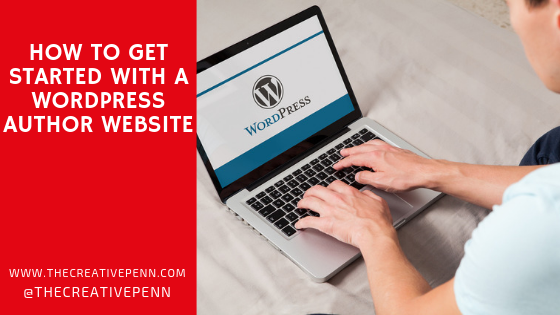Your author website is an important part of the marketing for your books. Rachel McCollin walks us through the different types of WordPress websites and how to set one up.
 Author websites: they fill some of us with inspiration, while others want to run for the hills. But it’s difficult to be a successful author in the current climate without your own website.
Author websites: they fill some of us with inspiration, while others want to run for the hills. But it’s difficult to be a successful author in the current climate without your own website.
You’ve probably read articles and heard podcasts with advice on the different website platforms you can use. Some are too limited, while others are too complicated.
Where to start?
I’ve been helping people create websites with WordPress since 2010 and I strongly believe that you don’t have to be a techie or hire a developer to get yourself a great WordPress author website.
In fact, I believe you can create a gorgeous website that helps you get mailing list signups without spending more than a few dollars a month and without writing any code.
In this post, I’ll help you understand the difference between the two WordPress platforms and give you some tips to help you get started creating your own. This is something you can do yourself if you have minimal technical skills – no coding required!
What is WordPress?
WordPress is what’s known as a Content Management System or CMS. It comes in two forms: WordPress.com and self-hosted WordPress, sometimes referred to as WordPress.org.
Here are the main differences between them.
WordPress.com:
- Hosted by WordPress – so your site doesn’t belong to you
- Plans ranging from free to different premium levels
- If you want your own domain name and extra plugins, you’ll need a premium account
- Limited newsletter signup plugins
- Limited themes unless you sign up for a premium account, but many of the free ones can be customised
- Gives you access to a community of other bloggers using WordPress.com
Self-hosted WordPress:
- Hosted on server space you rent from a hosting provider from as little as a few dollars a month (generally you pay more for better support)
- The site belongs to you and you can move it or make changes to it as you see fit
- Access to hundreds of thousands of free themes and plugins
- Free plugins for all the main mailing list providers
- Option to install premium themes and plugins you buy elsewhere (but make sure it’s a reputable source)
- Option to install the free Jetpack plugin which gives you all the same features as a WordPress.com site (e.g., the community)
- You need to keep your version of WordPress updated (or you have this happen automatically)
Neither platform requires you to have coding skills, despite what you may have been told about self-hosted WordPress.
WordPress.com is easier and cheaper if you have next to no technical skills. But in the long run, self-hosted WordPress can wind up cheaper as your hosting will probably be less than a WordPress.com premium plan.
 If you’re comfortable setting up Facebook ads or uploading a book to the publishing platforms, then I believe you have the technical skills to create either kind of WordPress site.
If you’re comfortable setting up Facebook ads or uploading a book to the publishing platforms, then I believe you have the technical skills to create either kind of WordPress site.
The good news is that WordPress has an importer tool built in – so if you decide to switch between platforms at some point in the future, you can. And all of the themes on WordPress.com are also available for a self-hosted site.
How to Get a WordPress Site
So, you’ve decided to get a WordPress site. Here’s how to do it.
For a WordPress.com site:
- Sign up for an account at WordPress.com
- Decide if you need a premium plan and pay for it if you do
- Buy a domain name from a domain registrar and link to your WordPress site
- Choose and customise your theme and plugins
- Start creating content!
Creating a self-hosted WordPress site isn’t all that different:
- Sign up for hosting with a hosting provider – they normally include a domain name for free.
- Install WordPress – you can either do this manually or using the installer your hosting company will provide.
- Choose and customise your theme and plugins
- Start creating content!
As you can see, setting up a self-hosted site isn’t much more complicated than a WordPress.com site. And it gives you access to thousands more free themes and plugins.
[Note from Joanna: Click here for my tutorial on how to set up your WordPress self-hosted website.]
Finding a Theme for Your Site
I’m often asked if there are WordPress themes designed specifically for authors. While there are a few (including some premium ones), you really don’t need a theme that’s designed for authors. You just need one that reflects your author brand.
When choosing a theme, consider:
- Is it customizable? Can you change the color scheme, for example?
- Can you add a banner image to the home page with a link to the page where people sign up to your mailing list?
- Are the fonts and layout consistent with your brand? Take some time looking at other author sites in your genre, especially indie authors.
- Is there a sidebar widget area where you can add a mailing list signup form and a list of your test posts or books?
- Is it kept up to date and is it compatible with the latest version of WordPress?
- Is it responsive, i.e., does it resize for smaller screens? You’ll find that most of your visitors are on mobile.
Take some time experimenting with some of the themes and seeing which you like best. You can always change your theme if you change your mind. You won’t lose any of your content but you will have to copy your widgets to the widget areas in the new theme.
[Note from Joanna: Click here for my tutorial on setting up the AuthorPro theme in WordPress.]
Installing Plugins
Once you’ve got your theme activated, you’ll need to add some plugins. Below are the five free plugins that I think every self-hosted author site should have.
- A mailing list plugin like MailChimp or ConvertKit. All the major mailing list providers have their own plugin.
- The UpdraftPlus backup plugin. Keeping your site backed up regularly is essential.
- The All In One SEO Pack plugin for SEO. This will help you rank higher in search engine listings
- The Defender security plugin, which will help protect your site from attacks and monitor it for you.
- Jetpack for all of the features of wordpress.com – social media sharing and lots more.
The first four of these are features you can add to a WordPress.com site with a premium account. And Jetpack’s features come baked-in.
For more on these plugins and why they’re important, you can read my blog post on the top five author website plugins.
Making Your Site Work Hard For You
Once you’ve got your site set up, you’re not done. Far from it! Now it’s time for the fun bit: creating content.
 If you’re a nonfiction author, your website will be an important source of new readers for you. Use your blog to demonstrate your expertise, share tips and whet people’s appetites for your books. Make sure you tweak your SEO settings so you’re getting a good search engine rankings for the things your readers are searching for,
If you’re a nonfiction author, your website will be an important source of new readers for you. Use your blog to demonstrate your expertise, share tips and whet people’s appetites for your books. Make sure you tweak your SEO settings so you’re getting a good search engine rankings for the things your readers are searching for,
But an author website can also be a great tool for fiction authors.
Think of the kind of content your ideal reader would want to read. That might be book recommendations or reviews, photos, and notes from your book research, book excerpts or stories, and updates on your writing. The kind of content you might put in your newsletter, you can also add to your blog, although you may want to give it a different tone.
Make sure you include links to your website in all of your books, on your Amazon author page, on your social media channels, your business cards: everywhere. The more people visit your site, the more will sign up to your mailing list. And then you can keep in touch with them.
The important thing is never to let your site go stale. Keep it fresh and interesting and it will avoid dropping in the search engine rankings and be interesting for your readers.
Good luck with your site!
Resources
Here are some resources to help you get started with your WordPress author website:
- WordPress.com (signup page)
- Recommended hosting providers for self-hosted WordPress (on my blog)
- Top 5 WordPress Plugins for Author Websites (on my blog)
- How to Build a WordPress Author Website and Use it Build a Mailing List – and Why You Should (via the Alliance of Independent Authors)
- How to Install WordPress – The Famous WordPress 5-Minute Install Made Simple (by me for Winning WP)
- How to Build Your Author Website in 30 Minutes – by Joanna Penn
- Moving Your Blogger / Tumblr / LiveJournal / Movable Type Blog to WordPress (by me for WPMU DEV)
- WordPress for Writers: Create an Awesome Author Website That Helps You Sell Books (my book)
Is your author website set up to your satisfaction? Please leave your thoughts below and join the conversation.
 Rachel McCollin has been helping people at all levels of technical expertise use WordPress since 2010. Whenever she goes to a writing event, she finds herself answering questions about author websites, so she’s decided to distill all that information into a book. WordPress for Writers is available now.
Rachel McCollin has been helping people at all levels of technical expertise use WordPress since 2010. Whenever she goes to a writing event, she finds herself answering questions about author websites, so she’s decided to distill all that information into a book. WordPress for Writers is available now.
You can find out more about the book, get tips on author websites and other writing-related topics and download a free author website blueprint at her website RachelMcWrites.com.
